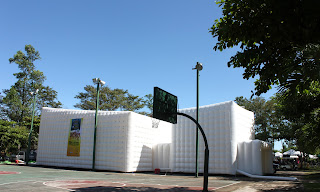How do
parents feel when they are told that their child has some kind of “defect”? When God assigns us the special task of
parenting a child with Down syndrome, autism, cerebral palsy or ADHD, our
natural reaction is to feel disappointment, distress, and sadness. There is worry, anxiety, and apprehension
about the future, anticipating the need for special care, and much unconditional
love, patience and perseverance.
I was
at the Christmas Party of the Down Syndrome Association of the Philippines last
Sunday, December 9, 2012, at the San Lorenzo Village Park, and met a new mother
of a child with Down syndrome.
Bella (not her real name) gave birth to her son two months ago and I had
the privilege then of visiting her at Cardinal Hospital. When I was informed about her child, I
had sensed a burden for her, that I should see her, to comfort her and help her understand that God has a special
purpose for her child’s life. But
no matter how I tried to encourage her, sadness and fear were written all over
her face.
The
Bible tells us that God sent the angel Gabriel to Mary, a virgin pledged to be
married to Joseph. Mary was young, and poor, and seemed unlikely to be chosen
by God to carry out an important task.
A young woman was to bear the Messiah who was to come and save us from
our sins. Through the Holy Spirit, Mary would be pregnant and would likely face
shame and even threats of danger. Mary courageously accepted the task in spite
of the great risks, and answered, “May it be to me as you have said,” Luke
1:38.
Re-reading
the story of the birth of Jesus Christ and meditating on these verses in Luke’s
Gospel made me ponder on these questions, “Did I willingly accept this special
task that God was entrusting to me when He gave me a child with Down syndrome?
Did I instantly obey Him -- or did I “make tampo”
(hold a grudge) with God? Am I ashamed of my child’s condition?” Like Mary, some of us as parents are
also asked by God to raise children with special needs born for a specific
purpose. Obviously, our special needs children were not created to save us from
our sins; nevertheless, God gives these children to us to accomplish His
purposes. He gives them as instruments to shape and mold our lives. Through them we learn to seek God and
pray to Him. We become better
people, and are given the opportunity to glorify God through our lives and the
lives of our children with special needs.
My
daughter Clarissa, born with Down syndrome, hearing- and speech-impaired,
physically handicapped and bipolar, is one of God’s greatest gifts to me.
Through her I am drawn closer to God and through her I learned to surrender all
my fears to Him. God works through
my daughter to strengthen my faith and mold my character, teaching me to rely
on Him on a daily basis. Clarissa
is not an accident. God chose Mary
to be the mother of the Messiah who would save the world, and this same God chose
me to be the mother of a child who has a special purpose in our lives.
Clarissa
has also been God’s instrument to comfort me most especially on important occasions
such as Christmas. Being separated
from my husband for six years has truly been difficult, spending Christmas Eve’s
alone in my room crying to God, asking Him to keep me company. It is during these moments that I would
experience God’s presence in a more intimate way. On Christmas day, I look forward to seeing my children and
grandchildren who come over to celebrate with me. While my two older sons, Carlo Miguel and Claro Paulo are now
both parents, I still have Clarissa to take care of for the rest of her
life. Clarissa is practically all
I have left. She is my best
friend, my prayer partner, and we do a lot of activities together. It is not always easy to take care of
her specially when she throws a tantrum. But God blesses me with a special kind
of joy when I’m with her and that encourages me to keep going.
 Mary’s
response to the angel Gabriel is an inspiration for us as parents to trust God,
for He knows that we are the best parents for our child with special
needs. And if God were to turn
back time and gave me a choice: would I be the parent of a special needs child
or not, I would still choose my daughter Clarissa. This time I
will tell the Lord, “May it be done to me as you have said.”
Mary’s
response to the angel Gabriel is an inspiration for us as parents to trust God,
for He knows that we are the best parents for our child with special
needs. And if God were to turn
back time and gave me a choice: would I be the parent of a special needs child
or not, I would still choose my daughter Clarissa. This time I
will tell the Lord, “May it be done to me as you have said.”
MALU TIONGSON-ORTIZ
Author of “Embracing God’s
Purpose for My Special Child”




















